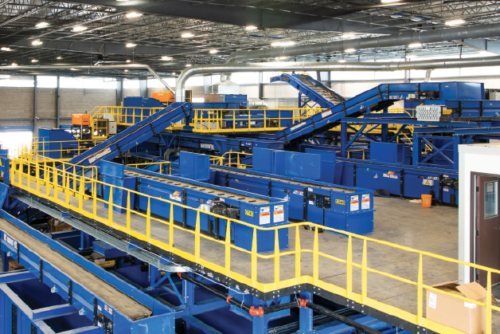Jun 16, 2025 | Education, Natural Resources - Testimonials

Written by Jim Newcomer, LOSN Materials Management Team
On March 20, 2025, I was one of three members of our LOSN Materials Management Team that toured the EFI Materials Recovery Facility (MRF) on Swan Island. The MRF is where Republic Services, our trash hauler in Lake Oswego, takes the commingled recyclables that you put out on the curb weekly in your recycling can. For most of us, once Republic Services picks that can up and dumps it into their truck, it just disappears.
In the real world, Republic hauls the contents of our cans to the MRF on Swan Island, drives across the scale and sells by the pound to EFI Recycling, the company that runs the MRF. EFI separates the materials into separate streams of cardboard, paper, milk cartons, bottles, cans and so forth and, in turn, bales them and sells the separated materials to the companies that turn them into new products – paper and cardboard mills, metal foundries and forges, and plastics manufacturers.
While at the Swan Island facility, we watched a Republic truck drive over the scale and dump its load on the paved floor in the entry. EFI weighed the load, determined payment, then shoved the dumped mix into the hopper to begin the long, messy, complicated process of separating the contents. At the end of the process, they bale the separated materials and sell them to companies that recycle each material – i.e., OCC (Old Corrugated Cardboard) and paper products to pulp mills, tin cans to a steel manufacturer, and glass bottles to a glass recycler on North Columbia Blvd. I wasn’t going to pass up a chance to see that.
The Tour
We walked into the office and met Jeff Murray, marketing manager, who welcomed and briefed us on their operations – and cautioned us with safety tips – then gave each of us a hard hat and a safety vest. Only then could we set out into the yard.
It was a challenging tour on two counts. The physical part came first, as we climbed up ladders, crept along narrow catwalks and constantly ducked to avoid protruding motors and blocks. The second was understanding what we were seeing.
Consider the facility and its paved drive-in lot cover more than a city block with a loud, shaking, confusing array of conveyors, blowers, belts and bins two stories high. It includes sorters, both automatic and human, as well as moving conveyor belts, wheels with spaced holes, blowers to lift the plastic up and out, and walkways along picking lines where people stood plucking weird items out as fast as they could as the mix rushed by on a wide belt. It is all carefully designed, of course, and it follows a logical progression from removing the cardboard to the dumping roller at the end of the last belt that disposes of the material that didn’t belong in the mix, the waste.
The crisscrossing layers pile above one another in a noisy, fast-moving jumble of large machinery, so that as we climbed ladders, walked catwalks, descended steel stairs, and ducked under things, we were trying all the while to hear our guide over the din.
At the end of each process, each of the separated materials except the glass was bound up in six feet square bales – cardboard, cans, office paper, milk cartons, etc. – to be shipped off to their respective factories for remanufacturing.
EFI’s Business Model Reinforces Sustainability
It was a great experience, capped off by a conversation in the office in which Jeff explained their business model. EFI, he explained, buys from several haulers in the Portland region, including our Lake Oswego hauler, Republic, but it’s not a certainty. There’s competition from other MRFs to get their loads, so that they must pay top dollar for what they buy. In turn, they sell the separated materials to their customers, the recycling manufacturers, for competitive prices that depend on the shifting market prices for recycled materials as well as the amount of contamination in their streams; that is, how much trash remains in the separated material. EFI proudly claims that they sell the purest product in our region – on average less than 8% contamination in a load.
That means that of all the stuff you put in your mixed recyclables can, only 8% doesn’t get turned into new products.
One truth came through in all our conversations as well as from the process we observed: the utter dedication of EFI to recycling and sustainability. All the employees we talked with had come to EFI from other recycling companies or programs in schools and nonprofits. They are focused on producing clean, uncontaminated bales of materials that they can sell at good prices to companies that will reprocess them and get them back into circulation as remanufactured goods. Indeed, their livelihoods depend on it.
With corrugated cardboard cartons (called OCC) and the poly-coated milk and soup cartons produced by Tetra Pak, of course, producing a pure stream is relatively easy. The material has high value, is easy to separate and can be recycled over and over without weakening the fibers. The cardboard mills that take the OCC can also accept a certain amount of ordinary office paper in the mix they buy without ruining their end products. Office paper is a little more demanding, but still not too picky. Cans can be separated using magnets.
But plastic bottles? They’re demanding. Most of the bottles we can recycle are blow-molded, but even within that limitation there are variations and each must be steered into a separate stream. Designating each type means much more than reading a number in the chasing arrows. The way the container was produced, for example, blow molded or thermo-formed, determines the way it can be recycled – the temperature and the mixes in the product, for example. More complex, manufacturers tend to mix in special additives to give their plastic special qualities, and each additive makes a separate category as well. A small amount of incompatible material can spoil a whole shipment. So EFI strives to deal only with the blow-molded bottles that belong in the curbside mix. Most Important: they can’t afford not to produce quality material with low contamination.
One unexpected measure of EFI’s dedication to environmental values is their pride in a small item that a casual visitor would never spot but that they spent over a million dollars to dig: the bioswale along the street beside them. They dug it a few years ago along the low edge of their lot to catch and hold the run-off. It guarantees that the rainwater running off their paved lot goes into the ground rather than into a sewer, where it would end up polluting the nearby river.
Future Plans with the New Recycling Law
We plan to return to EFI in six or eight months to see what changes they have made as a result of funds they receive when the new Extended Recycling Act goes into effect in Oregon next month.
A Personal Note: Having served one year as Executive Director of the Washington State Recycling Association, I am especially interested in this operation and in the effects of the new law. It will require the plastic manufacturers to pay into a nonprofit that will use the funds to support recyclers as well as – I think, I hope – to take back a certain amount of their products for reuse. The payments from the plastics manufacturers should enable recyclers to invest in improvements in machinery and capacity.
When the new law begins to take effect next month (July 1), we all hope that ordinary residents like us will be offered the opportunity to recycle a gradually wider range of plastics in our curbside cans, and the manufacturers will be motivated to use a narrower range of materials in their plastic packaging. We’re looking forward to the day, and we’ll share what we learn as the New Law unfolds.
May 12, 2025 | Schools
Lake Oswego Middle School is one of the flagship projects of the 2021 bond program. This project includes a full replacement of the existing Lake Oswego Junior High School with a highly sustainable, energy efficient building. The building will include modern learning spaces with flexible open spaces and amenities similar to the recent Lakeridge Middle School.
Construction started last summer and is planned to be completed by the summer 2026 in time for the ’26/’27 school year.
This ‘path to net zero’ building is 100% electric and boasts more than an 80% reduction in energy use compared to baseline energy consumption. The building features:
- a robust thermal building envelope with enhanced insulation,
- sun shading, and
- building mass.
Similar to Lakeridge Middle School, Lake Oswego Middle School will have a hybrid passive approach to heating and cooling systems. Passive heating and cooling systems utilize natural elements and building design to regulate indoor temperatures without relying on mechanical systems. The roof will have a large photovoltaic (PV) array, providing additional energy offset.
The school is being built to seismic level 4 standards, allowing for immediate occupancy following a major seismic event. Additionally, a generator on site is capable of keeping the lights on and essential systems operational for 3 or more days. Not only does this help protect our occupants but this allows for the building to be used as a community place of refuge.
Below are some renderings. View more information about the sustainability features.


